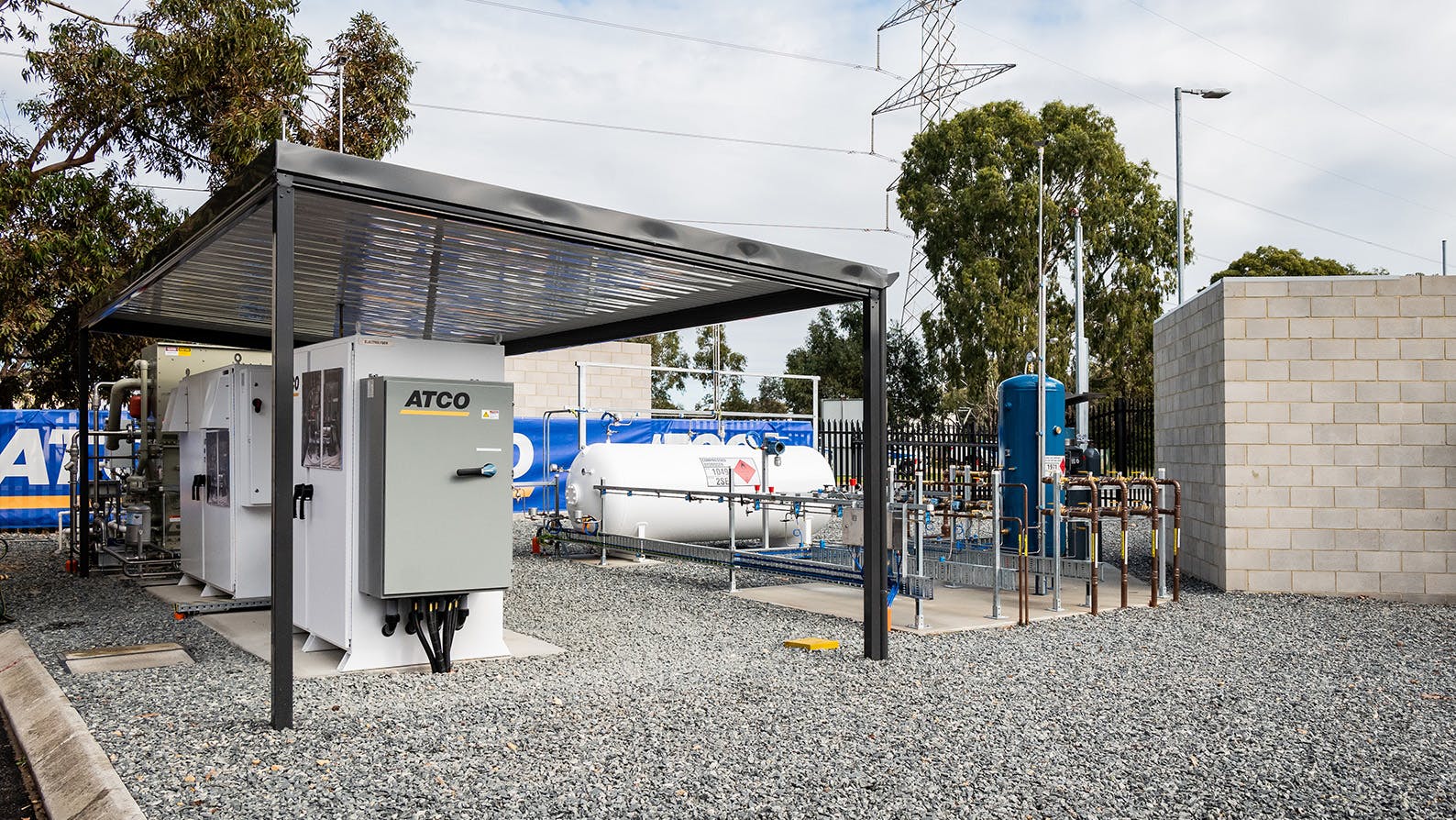For Nancy Southern, Chair & CEO of both ATCO and Canadian Utilities Limited, the collapse in energy prices, followed by a global pandemic and the movement toward cleaner forms of energy has catalyzed dramatic change for the company. Southern says the ability to respond to the changing environment has become part of ATCO’s DNA throughout its 75-year history.
ATCO was started in 1947 by R.D. Southern, 17 at the time, and his father S.D. Southern, who each invested $2,000 to start Alberta Trailer Hire - providing relocatable accommodations to workers in Canada's first oil boom. Through the ensuing decades, the company expanded internationally, working in more than 100 countries around the world. Along the way, it also diversified its operations – adding operational support services, natural gas and electric utilities, energy storage, power generation, and ports and transportation to its base businesses. More recently, the company is eyeing low-carbon hydrogen as a catalyst for future growth and a potential game-changer for the Canadian energy industry and economy.
“Some businesses see our current economic and social environment as the perfect storm. We flip that narrative on its head to examine how it’s the perfect opportunity. With the technology, skills, expertise and infrastructure at the ready, we have the key tools to act on new ideas.”
Seeds of change
For ATCO, the latest seed of transformation was planted half a world away – in Australia. In 2011, the company acquired WA Gas Networks, the largest natural gas distribution utility in Western Australia. The acquisition would become an important stepping-stone in ATCO’s clean energy journey.
The country, similar in many ways to Canada, has been an important proving ground for introducing hydrogen to natural gas distribution systems. In 2019, with Australia’s National Hydrogen Strategy as its guide and start-up funding from the country’s renewable energy agency, ATCO was able to build and test a closed system that integrated natural gas, solar, battery storage and electrolysis to power a modular home.
Southern is careful not to distinguish the project as new technology. “It’s not really a new product,” she says. “We’re using existing products and technology in new ways.”
ATCO’s interest in hydrogen down under soon graduated to a include a relationship with a mining partner – Fortescue Metals Group – to develop combined hydrogen production and refuelling infrastructure at ATCO’s Jandakot Operations Centre, located near Perth. The facility provides ATCO and Fortescue with the opportunity to refuel fleet vehicles capable of using hydrogen as the primary fuel source. Southern describes this as foundational work with vast potential, setting the stage to scale the innovation for widespread domestic use and test the international export market.

ATCO’s Clean Energy Innovation Hub was developed to test new ways of using clean energy sources.
The knowledge ATCO gained in Australia is now being applied in its work with Suncor. In May, 2021, the companies announced their collaboration on a potential world-scale hydrogen project near Fort Saskatchewan, which would produce more than 300,000 tonnes of clean hydrogen annually. Most of the hydrogen would be used at Suncor’s Edmonton refinery, reducing its emissions by up to 60 per cent, while approximately 20 per cent could be used in Alberta’s natural gas grid, further reducing emissions. Once operational, the project would have the capacity to reduce CO2 emissions by more than two million tonnes per year, the equivalent of taking 450,000 cars off the road annually.
Back to basics
It’s possible the seeds of change were sown even before Australia, well before the company’s partnership with Suncor. Southern speaks of the energy sector downturn and how strong economic headwinds in Alberta, particularly in 2015 and 2016, were challenging for the company. This resulted in layoffs and kickstarted a process to reimagine the company – and its growth prospects.
“Through our previous success and a very favourable economic environment, we had become order takers instead of business creators,” says Southern. “It wasn’t our success that forced us to find efficiencies and spur innovation. It was the downturn that pushed us to work harder to activate the imaginations of our people. To think about the art of the possible as opposed to letting our history dictate the path ahead.”
Southern led the organization through the transformation, asking big questions like: “How did we become who we are?” She reflects on the process.
“We used our imaginations. There were no limits. Yes, there were challenges, but we found our way through.”
While her voice grows heavy describing a time of organizational turmoil, she lights up when she speaks of the people powering the transformation. “I am so proud of the people of ATCO. At every level they have embraced a new approach – whether it’s a gas fitter figuring how to do things better or a manager challenging the boundaries of the possible – we are just now starting to reap the benefits of this difficult, yet necessary self-reflection.”
As if to reinforce the point, she refers to ASHCOR Technologies – “our little start-up company,” Southern says affectionately. ASHCOR uses proprietary technology to reclaim fly ash from ash ponds and landfills. Traditionally a by-product of coal-fired power generation, fly ash is used in a variety of applications, from concrete to soil stabilization.
The accelerated retirement of coal-fired power stations across North America, paired with growing fly ash demand and ASHCOR’s proprietary technology, has ATCO setting its sights on expansion throughout North America. The use of recycled fly ash instead of manufactured cement presents the opportunity to reduce the carbon footprint of concrete production – an industry that contributes about eight per cent of global CO2 emissions.
Exploring the possible
Exploring the boundaries of possibility is again becoming standard practice for ATCO. In true form, when discussing the merits of hydrogen, Southern thinks big:
“Hydrogen can be a nation builder. From coast to coast this is something that can be done to bring great prosperity to our country. To meet the world’s energy needs and decarbonize at the same time."
Pragmatically, she doesn’t shy away from acknowledging the challenges. “The principles of business are still very important.” She refers to investor expectations around risk, returns and delivering on projects.
Southern discusses the need to standardize accounting for ESG metrics to bring consistency to how capital investment in clean tech is valued. Technical expertise in the trades and modernization of learning curriculums are also areas of growing need. Southern points to a world in transition, referencing the lengthy time horizon to shift the capital stock (e.g. trucks, trains, ships and planes) of supply chains to alternative energy sources. She discusses implications of the carbon tax to the cost of goods and availability of alternative power sources and links the issues to both existing and potential pressure points for consumers, businesses and governments alike.
Southern believes the challenges can be navigated, attributing her optimism to the success of ATCO’s transformation. “It’s all possible,” she says. “We just need to figure out how to get out of each other’s way, instead of focusing solely on the things that could hold us back.”
Bright horizons breed optimism
Would the Chair & CEO of ATCO ever have imagined she’d be touting hydrogen as a nation builder? Simply stated, “no”. She brings it back to imagination and creativity that propelled ATCO from a $4,000 Alberta start-up in 1947 to the $22-billion multinational enterprise it is today.
A culture of transformation has served ATCO well. ATCO is a prominent example of resilience, determination and creativity – a distinctive Alberta brand that the province’s businesses and entrepreneurs have become known for. For early-stage companies and a tech sector that is gaining momentum right here in Alberta, ATCO exemplifies what it means to innovate and reinvent while never losing sight of the foundations that propelled the company’s success from the start.
And when it comes to future prospects for ATCO, Southern smiles with confidence, “we’re just getting started”.
About Nancy Southern
Nancy Southern is Chair & Chief Executive Officer of ATCO Ltd., and Chair & Chief Executive Officer of Canadian Utilities Limited, an ATCO company. She also serves as Executive Vice President of Spruce Meadows Ltd. and is a founding Director of AKITA Drilling Ltd., a Director of Sentgraf Enterprises Limited, an Honorary Director of BMO Financial Group, and serves on the Rideau Hall Foundation Board of Directors.
Ms. Southern has long played a prominent role in advocating on social issues of global importance— most notably, the rights of Indigenous peoples and the role of women in business. She is an Honorary Chief of the Kainai (Blood Tribe of Alberta) who bestowed the name Aksistoowa'paakii, or Brave Woman, upon her in 2012.
In 2020 she was awarded the British Empire Medal for services to British equestrian, military, and commercial interests in Alberta. In 2018, she received the Canadian Business Leader Award from the University of Alberta and was named a Distinguished Policy Fellow by the University of Calgary’s School of Public Policy in recognition of her lifetime commitment to Canadian public policy. She was inducted as a Companion into the Canadian Business Hall of Fame in 2017.





